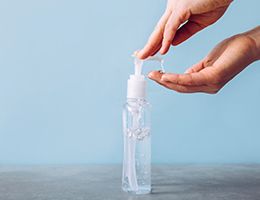Health library
Back to health libraryHand sanitizers: 8 do's and don'ts

You want to keep your hands as germ-free as possible. But if you regularly reach for hand sanitizer, it pays to know a few key facts, starting with this one: Washing your hands with soap and running water for 20 seconds is typically the best way to clean your hands.
If you don't have access to soap and water, a hand sanitizer can be a good alternative. Even so, you have to use the right product-in the right way-to get the most out of it. Here are some good-to-know tips:
1. Do use an alcohol-based hand sanitizer. It should contain at least 60% alcohol. Non-alcohol-based sanitizers may merely keep germs from multiplying—instead of killing them outright.
Also, be aware: Even an alcohol-based sanitizer doesn't eliminate all types of germs. Washing with soap and water is better at removing norovirus, the leading cause of foodborne illness; some parasites; and Clostridium difficile, which causes severe diarrhea.
2. Don't use a recalled hand sanitizer. Some hand sanitizers manufactured in other countries have used methanol (wood alcohol) as an active ingredient. That's a toxic alcohol that can cause blindness or death if absorbed through the skin or ingested. Others have been found to be contaminated with 1-propanol, which can also be toxic. (That's not to be confused with 2-propanol—also known as isopropanol or isopropyl alcohol—which is a safe ingredient.)
You can check the U.S. Food and Drug Administration's recall page to see if your hand sanitizer is on the list. If so, stop using it and report any problems you're having to your doctor or a poison center.
3. Don't make your own. Homemade hand sanitizers may not be effective and can sometimes be harmful. Some people have experienced skin burns from DIY products.
Also keep in mind that disinfectant sprays and wipes are meant to clean household surfaces. They are too harsh to use on your skin. Don't use them as a substitute for hand sanitizer.
4. Do check for dirt. If your hands are visibly dirty or greasy, hand sanitizers may not work well. Stick to tried-and-true handwashing, if possible.
5. Don't rely on hand sanitizers to remove harmful chemicals. It's unlikely that sanitizers can remove or inactivate chemicals like pesticides and heavy metals. If you've come in contact with them, wash your hands carefully with soap and water—or as directed by a poison center.
6. Do take your time. Use enough sanitizer to cover all the surfaces of your hands and fingers. Then rub your hands together until they feel dry. Hand sanitizers may not be as effective if you rinse or wipe them off before your hands are dry.
7. Don't swallow them. Hand sanitizers are not safe to drink. Doing so will not kill a virus in your body and can cause serious health problems.
8. Do be careful around kids. Keep hand sanitizers out of the reach of young children, who might mistake them for food or candy. As of February 2024, U.S. poison centers received over 2,770 calls about hand sanitizer exposure in kids 12 and younger. A child who swallows even a small amount of an alcohol-based hand sanitizer could be at risk for alcohol poisoning, which can be deadly in severe cases.
Call your poison center at 800.222.1222 if you or your child has swallowed hand sanitizer.
Handwashing the right way
There's handwashing and then there's handwashing. To be effective, these five steps are a must.
Reviewed 9/22/2025
